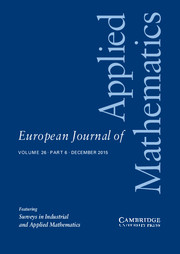Crossref Citations
This article has been cited by the following publications. This list is generated based on data provided by
Crossref.
Shen, W.
and
Vickers, G.T.
2007.
Spectral theory for general nonautonomous/random dispersal evolution operators.
Journal of Differential Equations,
Vol. 235,
Issue. 1,
p.
262.
Hutson, V.
Shen, W.
and
Vickers, G.T.
2008.
Spectral Theory for Nonlocal Dispersal with Periodic or Almost-Periodic Time Dependence.
Rocky Mountain Journal of Mathematics,
Vol. 38,
Issue. 4,
Bhowmik, Samir Kumar
2010.
Stable numerical schemes for a partly convolutional partial integro-differential equation.
Applied Mathematics and Computation,
Vol. 217,
Issue. 8,
p.
4217.
BURNS, M.
and
GRINFELD, M.
2011.
Steady state solutions of a bi-stable quasi-linear equation with saturating flux.
European Journal of Applied Mathematics,
Vol. 22,
Issue. 4,
p.
317.
K. Bhowmik, Samir
B. Duncan, Dugald
Grinfeld, Michael
and
J. Lord, Gabriel
2011.
Finite to infinite steady state solutions, bifurcations of an integro-differential equation.
Discrete & Continuous Dynamical Systems - B,
Vol. 16,
Issue. 1,
p.
57.
Bhowmik, Samir Kumar
2011.
Numerical approximation of a convolution model of -neuron networks.
Applied Numerical Mathematics,
Vol. 61,
Issue. 4,
p.
581.
Bhowmik, Samir Kumar
2011.
Stability and convergence analysis of a one step approximation of a linear partial integro-differential equation.
Numerical Methods for Partial Differential Equations,
Vol. 27,
Issue. 5,
p.
1179.
Stoleriu, Iulian
2011.
Non-Coarsening for Solutions to a Class of Evolution Equations.
Annals of the Alexandru Ioan Cuza University - Mathematics,
Vol. 57,
Issue. Supliment,
Bhowmik, Samir Kumar
2012.
Numerical convergence of a one step approximation of an integro-differential equation.
Applied Numerical Mathematics,
Vol. 62,
Issue. 12,
p.
1880.
Seleson, Pablo
Gunzburger, Max
and
Parks, Michael L.
2013.
Interface problems in nonlocal diffusion and sharp transitions between local and nonlocal domains.
Computer Methods in Applied Mechanics and Engineering,
Vol. 266,
Issue. ,
p.
185.
Bhowmik, Samir Kumar
2014.
Fast and efficient numerical methods for an extended Black–Scholes model.
Computers & Mathematics with Applications,
Vol. 67,
Issue. 3,
p.
636.
Bhowmik, Samir Kumar
2014.
Piecewise polynomial approximation of a nonlocal phase transitions model.
Journal of Mathematical Analysis and Applications,
Vol. 420,
Issue. 2,
p.
1069.
Ververis, Antonios
and
Schmuck, Markus
2017.
Computational investigation of porous media phase field formulations: Microscopic, effective macroscopic, and Langevin equations.
Journal of Computational Physics,
Vol. 344,
Issue. ,
p.
485.
Burger, Martin
2021.
Network Structured Kinetic Models of Social Interactions.
Vietnam Journal of Mathematics,
Vol. 49,
Issue. 3,
p.
937.
Moşneagu, Ana-Maria
and
Stoleriu, Iulian
2024.
An adaptive time-step method for a nonlocal version of the Allen-Cahn equation.
Discrete and Continuous Dynamical Systems - S,
Vol. 0,
Issue. 0,
p.
0.


